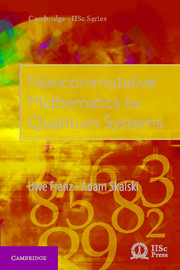1 - Independence and Lévy Processes in Quantum Probability
Published online by Cambridge University Press: 18 December 2015
Summary
Introduction
Quantum probability is a generalization of both classical probability theory and quantum mechanics that allows to describe the probabilistic aspects of quantum mechanics. This generalization is formulated in two steps. First, the theory is reformulated in terms of algebras of functions on probability spaces. Therefore, the notion of a probability space (Ω, ℱ, P) is replaced by the pair (L∞ (Ω), E(.) = ∫Ω. dP) consisting of the commutative von Neumann algebra of bounded random variables and the expectation functional. Then, the commutativity condition is dropped. In this way we arrive at the notion of a (von Neumann) algebraic probability space (N,Φ) consisting of a von Neumann algebra N and a normal (faithful tracial) state Φ. As we have seen this includes classical probability spaces in the form (L∞(Ω), E), it also includes quantum mechanical systems modeled by a Hilbert space H and a pure state ψ ∊ H (or a mixed state ρ ∊ S(H)), if we take N = B(H) and Ф the state defined by Ф(X) = 〈 ψ, X ψ 〉 (or Ф (X) = tr(ρX)) for X ∊ B(H). Note that in this course we shall relax the conditions on N and Φ and work with involutive algebras and positive normalized functionals, that is, *-algebraic probability spaces.
A striking feature of quantum probability (also called noncommutative probability) is the existence of several notions of independence. This is the starting point of this course, which intends to give an introduction to the theory of quantum stochastic processes with independent increments.
However, before we come to these processes, we will give a general introduction to quantum probability. In Section 1.2, we recall the basic definitions of quantum probability and discuss some fundamental differences between classical probability and quantum probability. In Section 1.3 we address the question ‘Why do we need Quantum Probability?’ We discuss the EPR experiment and the Kochen–Specker Theorem, which show that we cannot model quantum physics with classical probability spaces because the values of observable quantities do not exist unless we specify which measurement we will carry out and which quantities we will determine. In this sense quantum physics requires a more radical description of chance.
- Type
- Chapter
- Information
- Noncommutative Mathematics for Quantum Systems , pp. 1 - 120Publisher: Cambridge University PressPrint publication year: 2016



